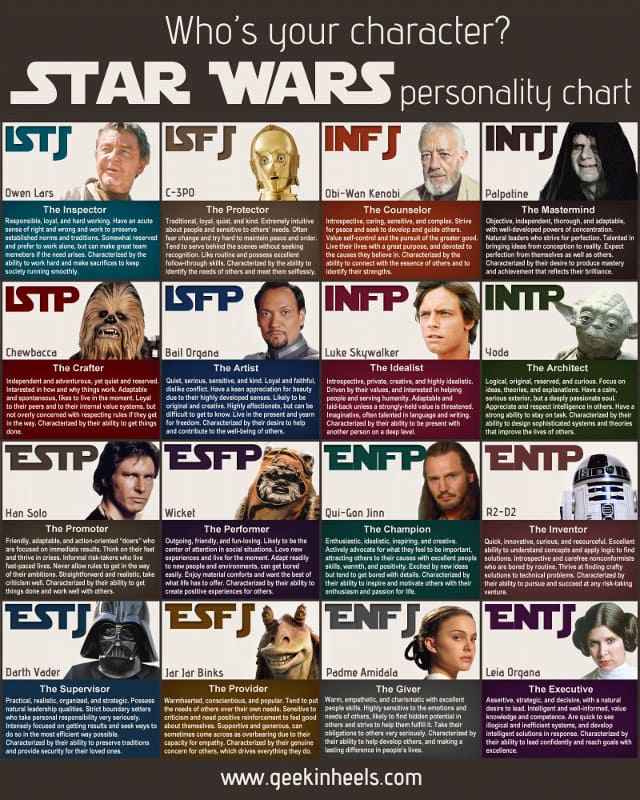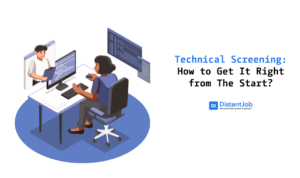As much is true that remote teams are more productive, it is also true that some personalities work better than others in a remote setting. How to spot the core characteristics of these personalities when interviewing candidates?
With human psychology, you can’t just follow a protocol. Yet, the Myers-Briggs Personality Type Indicator (MBTI) can give you a good grasp of how they may perform when you aren’t around to manage them.
Personality tests, of course, shouldn’t be the last word on whether you hire a candidate. But they can be useful in two ways. First, they can give you some insights into a person’s psyche, and second, to break a tie between two equally qualified candidates.
Speaking of remote workers, you already know that some personalities are better suited for a virtual team than others. And following this course of thought, you should look out for those characteristics while interviewing your candidates.
Table of contents
- Which Personality Traits Matter The Most To Your Company
- How do personality tests work?
- How to Use Myers-Briggs Type Indicator Test for Building Remote Teams?
- What is the Myers-Briggs Type Indicator (MBTI)?
- MBTI Function Pairs
- Common problem with personality tests
- Finding the happy medium
- Scale your Remote Team
To what extent can employees rely on the Myers-Briggs type indicator to build a team of employees, united by mutual professional culture? When can personality quizzes help you discover the next big talent for your organization, and when can they cost you a great candidate? Do they contribute to the recruiting process, or harm it? Can they pin down something as complex as a human’s inner world? The business of personality tests is growing rapidly, and so is the debate surrounding it.
Which Personality Traits Matter The Most To Your Company
To answer those questions, you first have to take a look at your company’s needs and goals, and culture. What are the most important things you are looking for in a candidate on a personal, human level? This will determine what kind of personality test you need to use in order to identify those qualities in a person’s answers.
For example, does your company deal with tight deadlines, stress, pressure? Is there an emphasis on quantity and speed? There you have it – you need to find a personality quiz with a focus on determining a person’s time management skills and ability to cope with stress.
Looking for team players who would ideally train others or bring new clients to your firm through personal interaction in the long run? The test then needs to dive into real-life-type situations and explore a person’s sensitivity, extroversion, agreeableness, how adaptable he/she is to new environments, how prone he/she is to understand another human being.
Are you looking for a well-rounded employee? You need a test that covers various aspects of a person’s thought processes.
How do personality tests work?
The Myers-Briggs type indicator defines four major categories which are meant to encompass all human actions, thoughts, and qualities. These four groups have a lot in common with the widely accepted Big Five personality traits – Extroversion, Agreeableness, Conscientiousness, Neuroticism, and Openness to experiences. The Myers-Briggs questionnaire defines your character in terms of each of the four groups, making for 16 personality types altogether – 4×4.
If that sounds complicated, imagine for a second that your personality was a picture, making personality test selfies. The Myers-Briggs method uses four different pairs of contrasting colors to draw that picture, the colors being key personality traits. Questions are meant to determine which of the two colors would prevail in each pair.
However, the more nuanced the palette becomes, the trickier things get. The hiring process usually consists of personality tests that put you in imaginary situations and offer you choices. As you can imagine, 3 or more options don’t always include the exact reaction you might have in mind, one that might reveal something that makes you stand out.
Some personality quizzes try to tackle that by having you choose an answer that is the closest to the truth, and one that is further to the truth. This method is designed to narrow down your personality without getting overly specific.
However, this approach can sometimes leave potential employees frustrated because none of the suggested options truly reflects the reality. The answer that is meant to be the closest to the truth doesn’t actually come that close at all. The furthest away from the truth might have crossed your mind a couple of times.
The answers can be too complex and lie in the gray areas where even the Myers-Briggs’ brainchild might not have access to. The picture can become blurry, and only real human interaction and specifically-tailored questions go beyond personality tests and quizzes.
How to Use Myers-Briggs Type Indicator Test for Building Remote Teams?
Rather than going at it trait by trait, a personality test can give you a general guideline for the type of people to gather in your remote team. It could work as a starting point for building a well-functioning group that can not only handle the work that comes but strives to achieve greater things together.
Without a doubt, the most popular of the personality tests is the Myers-Briggs Type Indicator (MBTI). Eighty-nine out of hundred Fortune 100 companies use this test.
What is the Myers-Briggs Type Indicator (MBTI)?
MBTI is based on Swiss psychiatrist Carl Jung’s theory of psychological types. He notes that people prefer to use their mental capacities in certain ways. Based on that behavior, the Myers-Briggs test divides people into one of 16 personality types.
Dividing the entire human race into only 16 groups is reductive. But, despite its limitations, this personality test can be used as a parameter for how a person might behave under certain circumstances.
Therefore, in addition to considering your remote candidates’ skills and abilities, knowing their personality types may give you a better grasp of how they may perform in a virtual setting.
MBTI Function Pairs
Meyers Briggs personality test divides people based on how they prefer to work. Here are the four dichotomies quoted from the Myers-Briggs Foundation:
- Favorite world: Do you prefer to focus on the outer world or your inner world? This is called Extraversion (E) or Introversion (I).
- Information: Do you prefer to focus on the basic information you take in or do you prefer to interpret and add meaning? This is called Sensing (S) or Intuition (N).
- Decisions: When making decisions, do you prefer to first look at logic and consistency or first look at the people and special circumstances? This is called Thinking (T) or Feeling (F).
- Structure: In dealing with the outside world, do you prefer to get things decided, or do you prefer to stay open to new information and options? This is called Judging (J) or Perceiving (P).
It’s important to clarify that the above four are absolutes in theory. In the real world, people hardly ever function in absolutes but rather in gradations. That is to say, a person may have a dominant left side or the right one. But they will need to use both to function.
Combining the above four dichotomies give you a matrix of 16 personality types.
Here’s a quick look at the 16 personality types according to Myers-Briggs Type Indicator – Star Wars is always the best to illustrate these personalities!
Building the Best Remote Team with Myers-Briggs Personality Test
Having the option to diversify your intellectual assets is the entire point of using a personality test when building a team. Just like all your team members can’t be leaders, they can’t all be creative, nor will everyone have a great eye for detail. It would be futile to expect everything from every one of your teammates.
But assigning people tasks based on their natural tendencies can ensure higher success rates in their works. Further, a wholesome team that consists of people with complementary skills and personalities and attitudes just might be the secret to turning your remote team into an autonomous unit.
1. The Idealists You Want On Your Remote Team
The Idealists envision the impossible, work with passion, and are guided by their beliefs
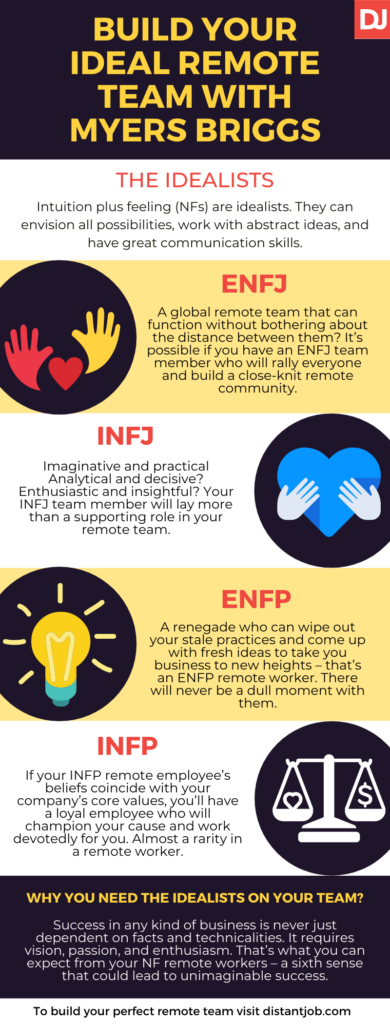
ENFJ – The Giver
The underdog who conquered the world with love and kindness, like Dr. Martin Luther King Jr. Warm, generous, giving – why wouldn’t you want that?
Between the Myers Briggs personality types, ENFJs are “people persons.” They are sensitive to the needs of their teammates and what motivates them. They can perceive the best in others and aspire to achieve their goals.
What they bring to the remote work table
For many managers, the main point of contention for remote work is that it breeds unfamiliarity and distance. If you have an ENFJ on your remote team, you’ll have little to worry about in that regard. These types of remote workers can bring everyone into the fold, get them to share, and build an effective remote community.
INFJ – The Counselor
Let me ask you this, do you want Oprah on your team or not?! (Yes! Ms. Winfrey is an INFJ, and the answer is yes, you do want Oprah on your team – always.
INFJs are practical idealists with an active imagination. Between all our personality types, they are insightful and committed, and they won’t take anything at face value.
What they bring to the remote work table
If your business demands creativity and innovative ideas, gather as many INFJs in your team as you can find. Or, do you need a solution never before heard of? Need an in-depth analysis of a situation? INFJs are all what you need.
They are committed, organized, and decisive. No matter what, you can expect them to carry out working remotely without missing a beat.
ENFP – The Champion
The rebel without a cause who will break down your existing structures just because it’s something to do. Sounds scary, but bring in one in case you need to innovate.
Perceptive and thoughtful, imaginative, and enthusiastic, ENFPs are individualistic and prefer to innovate more than to follow the status quo.
What they bring to the remote work table
If you have a remote position that constantly requires innovation, what you want is an ENFP type.
They can make connections quickly and have the readiness to act on that information. Just remember, they will have their ways of doing things and likely not follow strict rules. So if you don’t mind a rule-breaker who can bring new ideas to the table, an ENFP might be the right choice for your remote team.
INFP – The Idealist
Sure, any business could use a dose of idealism. But if yours entails creating original content – you couldn’t do better than to hire INFPs. William Shakespeare, J. R. R. Tolkien, William Blake, Vincent van Gogh…all INFPs.
INFP personality types are governed by their values and like to uphold them in action. They are keen to find new possibilities in things and like to see others reach their full potential.
What they bring to the remote work table
Remote workers are often erringly attributed to being fickle. Well, not if you are an INFP personality type.
If their values align with the core values of your company, then you’ll have a loyal employee who will work hard to bring success to your business. And since they are value-driven, they will be quite flexible and adapt to your needs – as long as their beliefs are not compromised.
2. The Artisans You Want On Your Remote Team
The Artisans implement theories, craft applications, and work with dedication
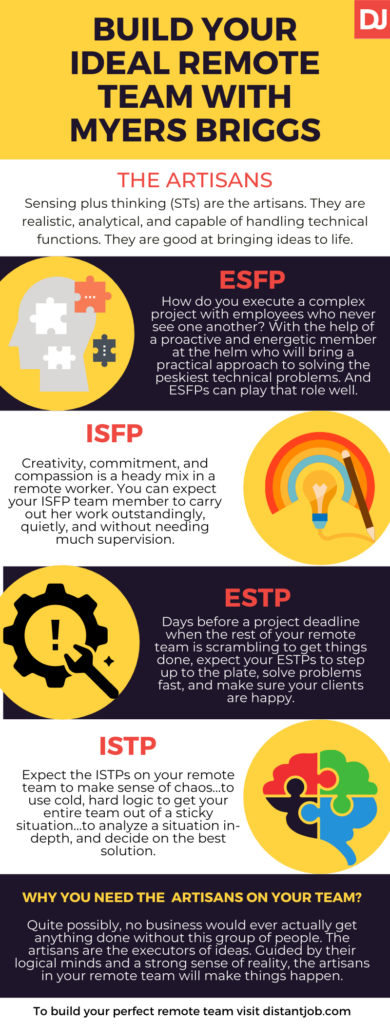
ESFP – The Performer
Maybe your remote team, too, needs a frontman, a golden boy who will champion your brand. Pick an ESFP for the role.
Strong interpersonal skills, a sympathetic ear, the ability to acquire new skills, and a hands-on approach identify the ESFP personality type. They rely on common sense, are spontaneous, and like to be in the spotlight.
What they bring to the remote work table
A strong affable personality who can transcend the geographic borders is in an ideal position to lead a group of people who don’t share a common workspace. Given their flexibility and realistic approach, readiness to work with new people, and make work enjoyable. Between all the personality types, ESFPs would make great team leads in a remote team.
ISFP – The Composer
The quiet creator who won’t draw much attention to herself, but before you know it will build you a Sydney Opera House…yeah, remote teams need plenty of ISFPs.
ISFPs are warm and gentle, aware of their surroundings, and like to live in the moment. With their penchant for meeting new people and having new experiences, they make great co-workers.
What they bring to the remote work table
ISFP personalities are ideally suited to working remotely because they love to create their routine while remaining committed to their work. They will, however, reserve their opinions since they dislike disagreements and might need extra help coming out of their shells.
ESTP – The Doer
Churchill, the Roosevelts (both Teddy and FDR), Patton weren’t exactly “netflixing” their lives away. They solved problems, stood their grounds, and helped people. Do you think your business could use some of that?
Of all the personality types, ESTPs are result-oriented as some of the most hands-on and pragmatic people. They look at immediate problems and try to solve it rather than thinking long-term.
What they bring to the remote work table
If a remote role demands a logical and pragmatic approach, high-paced work turnaround, and fast problem solving, then the ESTP is the type to rely on. While they won’t be keen on planning ahead or preparing contingencies, they will solve immediate problems and with enthusiasm.
ISTP – The Craftsman
Talk, talk, talk! Someone needs to get things done. Better get an ISTP on your remote team.
Efficient, methodical, and able to perceive the main problem in the midst of chaos, ISTPs are analytical and logical individuals.
What they bring to the remote work table
The way global remote teams function, there are bound to be occasions when a problem arises, and a manager is unavailable to solve it. In those situations, the rational and logical ISTP individual can take to the battle station and quickly help the team solve the problem.
3. The Guardians You Want On Your Remote Team
The Guardians are congenial and pragmatic people who genuinely care about others
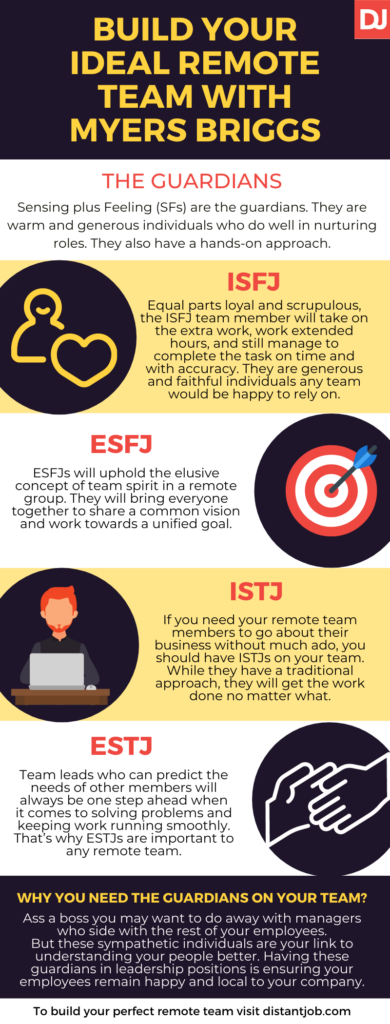
ISFJ – The Nurturer
The ultimate sidekick, the old faithful, your very own Samwise Gamgee. How could you even function without one?
Careful and committed, conscientious and considerate best describe the ISFJs. They also happen to be loyal, devoted, and generous.
What they bring to the remote work table
Remote positions that require 100% accuracy demand the diligence of ISFJ employees. Additionally, their kind-hearted warmth and generous giving. They will contribute to the team unselfishly and create a pleasant remote work environment.
ESFJ – The Provider
When your business means business, you better have a few ESFJs on board. Andrew Carnegie and Sam Walton were both ESFJs.
ESFJs are congenial, effervescent people who like to work in a team and create an accord and maintain peace in the group.
What they bring to the remote work table
Teamwork becomes even more important in a remote environment where individual members can’t see one another all the time. An ESFJ personality is ideal to bring about that harmony conducive to teamwork. They can make sure that the work not only gets completed, but it also does so on time.
ISTJ – The Inspector
Let’s play a game of stereotyping: chinos, tucked-in, buttoned-up shirt, and hair cut like an eight-year old’s – what type of worker comes to mind? Reliable, traditional, goody-two-shoes? You got it, that’s whom you get with your ISTJ teammate.
Hardworking and dependable, organized, and responsible, ISTJ personalities can also be reserved and traditional.
What they bring to the remote work table
If you’ve ever questioned whether your remote employee will work properly without you monitoring him, you can lay those doubts aside for the ISTJ personality.
Organized and logical, responsible, and patient, the ISTJs are your remote journeyman workers. They are dependable, practical, and will work until they have achieved their goals. Watch out though, sometimes they are reserved, and you may have to urge them to share their views in a team setting.
ESTJ – The Supervisor
So you need someone to fight the good fight, without going all gung-ho? ESTJ is the answer.
ESTJs have a good sense of social responsibility. They are organized and down-to-earth. They also like to help people and lead by example.
What they bring to the remote work table
Every remote team member cannot be responsible for ground-breaking innovations. Your team will also need someone to do the routine work without missing any details, carry out tasks in the most efficient way possible, and rile others to do the same. Those team members are likely ESTJs – dedicated and honorable, helpful, and practical.
4. The Rationals You Want On Your Remote Team
The Rationals are resourceful leaders who remain cool under pressure and deliver results
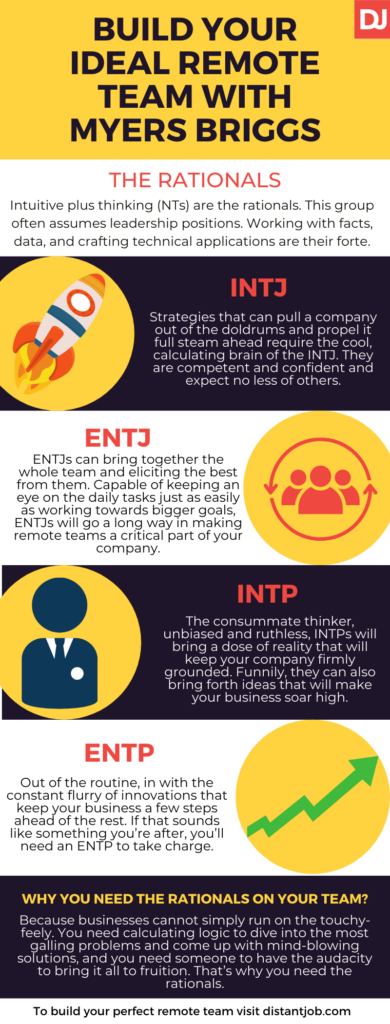
INTJ – The Mastermind
No matter where your group is located, you’ll need someone to consider why the apple fell from the tree. That’s why you deserve an INTJ.
Between all personality types, INTJs easily detect patterns, craft long-term strategies, and unearth reasons for the way things happen. They like to work alone and are competent in their work.
What they bring to the remote work table
Is your business going to launch a new product? Can it use a new strategy to beat your competitor’s? Then bring an INTJ.
These apparent lone wolves may not be the chattiest members of your remote team, but you can rely on them to supply you with farsighted ideas that will give your business a decided advantage. To boot, you can expect the INTJ to work to the highest standards – but they will expect the same from other team members.
ENTJ – The Commander
The team member most like Alexander Hamilton, a.k.a., knows power is currency – is your ENTJ remote team leader.
ENTJ personality types can strategize and implement procedures that make work more efficient. They are decisive and naturally assume leadership positions. Pushing boundaries, overcoming obstacles, and coming to a viable conclusion is a natural way with this group.
What they bring to the remote work table
As remote work evolves, you have to remember that remote positions are not just for auxiliary roles. Managers and leaders also have remote positions. And if that’s the case with your business, then the ENTJ is possibly most suited to such positions.
They can strategize long-term plans while keeping an eye out for routine work. They’ll take charge of situations and control them, detect inefficiencies and fix them, and help your business overcome obstacles and achieve new goals.
INTP – The Thinker
A healthy business often needs a narrator to call it like it is, without unduly bowing to the “boss man.” In that case, you could do worse than an INTP.
Unbiased, insightful, and creative, INTP personalities are some of the most logical people on earth. They are analytical by nature and like to work with the abstract.
What they bring to the remote work table
If your remote team could use someone capable of plunging the depths of a problem and coming up with creative solutions, then you’ll want an INTP personality on your team. With an eye for detail, for patterns, and for critical analysis, INTPs can help you discover new avenues of growth for your business.
ENTP – The Visionary
A good story needs a villain…a good business just might need a Machiavelli. An ENTP is it.
Last but not least, ENTP personalities are watchful, resourceful, and opinionated. They are not bothered by things like routine or schedule; they deeply dislike repetitive work.
What they bring to the remote work table
The mold-breaker looking for the next challenge, bored by routine tasks…but brings A-game when brainstorming ideas – that’s the ENTP in a remote team.
Rational and objective, you can expect this type of employee to come up with ingenious and strategic solutions. Just remember, in a routine role, they’ll be stifled.
As we said at the beginning, in real life people get a bit of each personality’s traits. Myers Briggs Test can help you spot the best candidates for your role alongside technical skills. Just remember, these personalities are a guide, not a protocol!
Common problem with personality tests
They can be inaccurate
In something as complex as human interaction, a few generalized answers can often fall short of covering all possible outcomes and approaches to deal with a problem or a delicate matter. Nuanced situations require nuanced answers, and trying to recreate those through an automated test with automated answers can have a negative effect. Candidates might not be able to shine the light on the strongest parts of their character.
They might end up feeling robbed or as if they are applying for a position where their unique personality will not only stay under the surface but is encouraged to do so. And regardless of the job, that’s something people rarely see as a perk.
Self-definition of character
Another key issue many people encounter with personality tests is with the direct questions about the candidate’s own character. For example, some would have you choose 3 personality traits that you consider to be your best, and 3 you see as the worst.
That can force you to become a show-off and define yourself as the super creative, extremely sensitive and fun guy everybody loves on the one hand, and on the other side, cause a bad impression by claiming to be the distracted, slow and procrastinating candidate many employees might see as a potential liability.
You don’t have the possibility of more detailed, in-depth answers that can truly reflect your personality and what you could actually bring to the table. You can’t explain that your biggest shortcoming has always been that you are often late, but one of your best qualities is your self-criticism which pushes you to straighten out your flaws.
This procedure is nothing like a psycho-thriller type of profiling session where you are the main villain, and the deep roots of your evil nature are being pinned down. Personality tests are mostly meant to put you in relatively broad categories, with some that go the extra mile.
Both can be a good or bad choice, depending on the stage of the hiring process and the extent they are utilized in.
Manipulating answers – good and bad
And as you can imagine, manipulating answers is far from impossible. From reading a job description and a little bit about a company, you don’t have to be a genius to get an idea about which answers are likeliest to bring success. This task can vary in difficulty, depending on the ambiguity of the personality quizzes.
However, on that note, it’s worth mentioning that manipulating answers isn’t necessarily a bad thing. It’s similar to preparing cheat sheets for a test. You need to devote some time to try to predict the questions, then writing the answers, which ultimately results in you learning.
Manipulating answers on personality tests can work on the same principle – it can mean a candidate has taken the time to grasp your company’s visions and possibly possesses the sensitivity and adaptability to tailor his/her answers accordingly.
Finding the happy medium
As with most complex human issues, finding the happy medium is key. The Myers-Briggs type indicator is ground-breaking work that has contributed enormously not just to the hiring process, but life altogether.
Personality tests can prove to be of huge help when sifting out candidates based on answers you consider to directly correlate to incompatibility with your company’s vision. They can be a very time-efficient method for getting a better idea of potential employees’ personal traits and character, what you might expect from them and what you might have to keep an eye out for. Personality quizzes can help you narrow your choices while saving you a lot of nerves and energy.
However, they should never be the highest authority or the sole factor. They can do you a lot of good as a complement to the hiring process, a reinforcer, and facilitator, but not as a dictator. Personality tests should be used as a stepping stone to getting to know someone even better and asking the real questions yourself while letting the person give real, unautomated answers.
Scale your Remote Team
It would be silly to expect every INFJ to turn out to be Oprah Winfrey or every ESFJ to have the business acuity of Andrew Carnegie. But surely, you’d be better positioned having an ISTJ draw up your client proposal, an ESTP does the actual coding, and an ENTJ makes sure the deliverables were ready on time.
Myers Briggs Type Indicator personality test paints with broad strokes and won’t render a complete picture of your candidate just as a resume won’t. But hiring is never just quite a summation of skills and experiences. Somewhere, personality creeps in.
Whether hiring for in-office teams or remote ones, managers agree that the most important factor that makes a great candidate a company’s ideal one is not skilled, rather their fit with the company culture and the existing team. You’ll be better armed to find that ideal candidate using the MBTI as a general guide.
At DistantJob we put in a keen effort to find candidates who will fulfill the demands of your work position not only from a technical point of view but also by considering how they will gel with your existing team. If you don’t want to muck about with personality types and just want a perfect remote team that suits your need in every way imaginable – just let us do the work for you.

